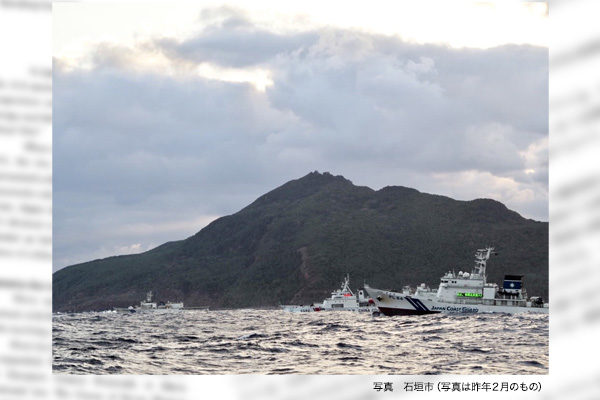Facing the danger of Chinese invasion, Japan’s Senkaku Islands are kept under heavy guard by the Japan Coast Guard. However, the Japanese government does not allow anyone other than national government officials to land on the unmanned islands, limiting its management operations to maintenance checkup of a lighthouse on Uotsuri Island of the island group. In such circumstances, it may be difficult for foreign countries to recognize that the Senkaku Islands are under the administration of Japan.
The United States has assured that it would defend the Senkaku Islands under the obligation of Japan-U.S. Security Treaty. But the premise for the assurance is that the islands are under the administration of Japan. Japan is urgently required to enhance its effective control of the islands.
While the national government fails to do so, Okinawa’s Ishigaki municipal government that has administrative jurisdiction over the islands has had a sense of crisis about China Coast Guard’s activities around the islands and embarked on the management of the waters in accordance with the city’s basic maritime plan. On the early morning of January 30, the municipal government implemented an oceanographic survey in the waters, following last year’s similar move. As municipal government officials are barred from landing on the islands, they undertake the conservation of the maritime environment and the caretaking of fishing grounds to demonstrate the Senkakus as under Japanese administration.
Oceanographic survey to demonstrate the islands as under Japanese administration
On 336 days last year, CCG ships entered waters around the Senkakus, approaching Japanese fishing boats operating in Japan’s territorial waters. China published video footage of such events in propaganda campaigns to insist that the Senkakus are under Chinese control.
China has flexed its muscles. The CCG, which has become a quasi-military under a CCG law, has about 40 patrol ships armed with 76mm rapid-fire guns usually installed on military ships. Some of them have entered Japanese territorial waters around the islands.
The latest oceanographic survey attempted to implement U.N. Sustainable Development Goal (SDG) 14 of conserving “life below water,” collecting basic oceanographic data and looking into fish resources as well as surveying vegetation on the islands. A drone was used to photograph the southern slope of Uotsuri Island. The survey team observed plant depletion caused apparently by goats, and confirmed drying phenomenon and collapses of the slope. If the islands are left untouched, plants may extinct, with ecosystems being lost. Surveyors are required to land on Uotsuri Island as soon as possible to look into details of local ecosystems.
Indispensable SDF-JCG cooperation
Towards the latest survey, the JCG was on high alert from an early stage. On January 30, state-run China Central Television quoted a CCG spokesperson as saying that CCG ships expelled five Japanese ships from waters around the Senkakus. In fact, however, CCG ships could not even approach the Japanese survey ship. On the day, four CCG ships entered Japanese territorial waters around the Senkakus, and two others were seen in the contiguous zone outside the territorial waters. But these CCG ships were put under JCG surveillance. The JCG clearly excels the CCG in guarding skills.
However, CCG ships have been heavily armed, indicating that the JCG could become unable to counter the CCG in the future. The JCG would also have to consider protecting residents in preparing for a Taiwan contingency. In line with the three Japanese national security documents adopted by the cabinet late last year, the Self-Defense Forces and the JCG should divide roles and cooperate with each other according to their respective characteristics.
Yoshihiko Yamada is a director of the Japan Institute for National Fundamentals and a professor at Tokai University. He is specialized in maritime issues.


